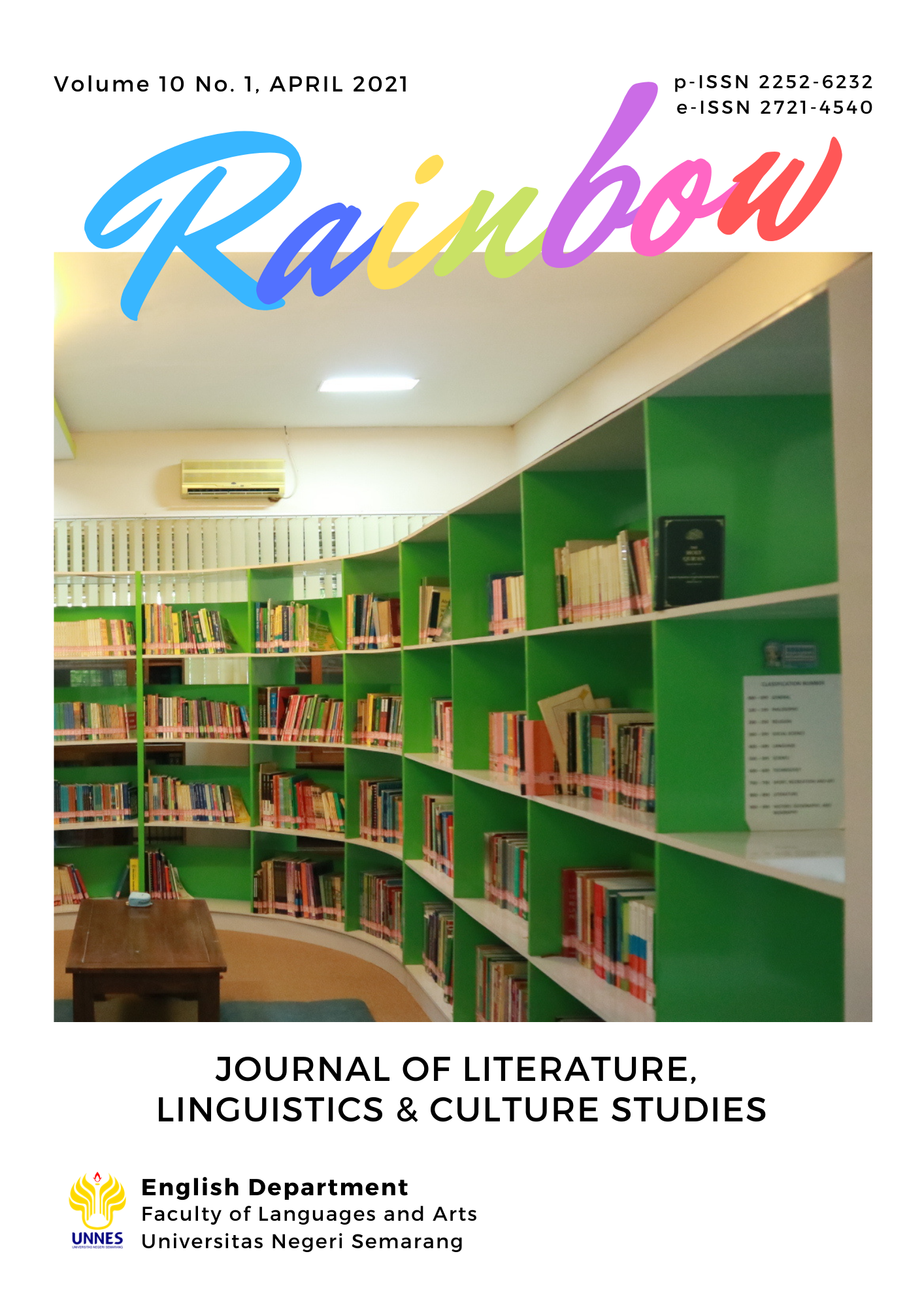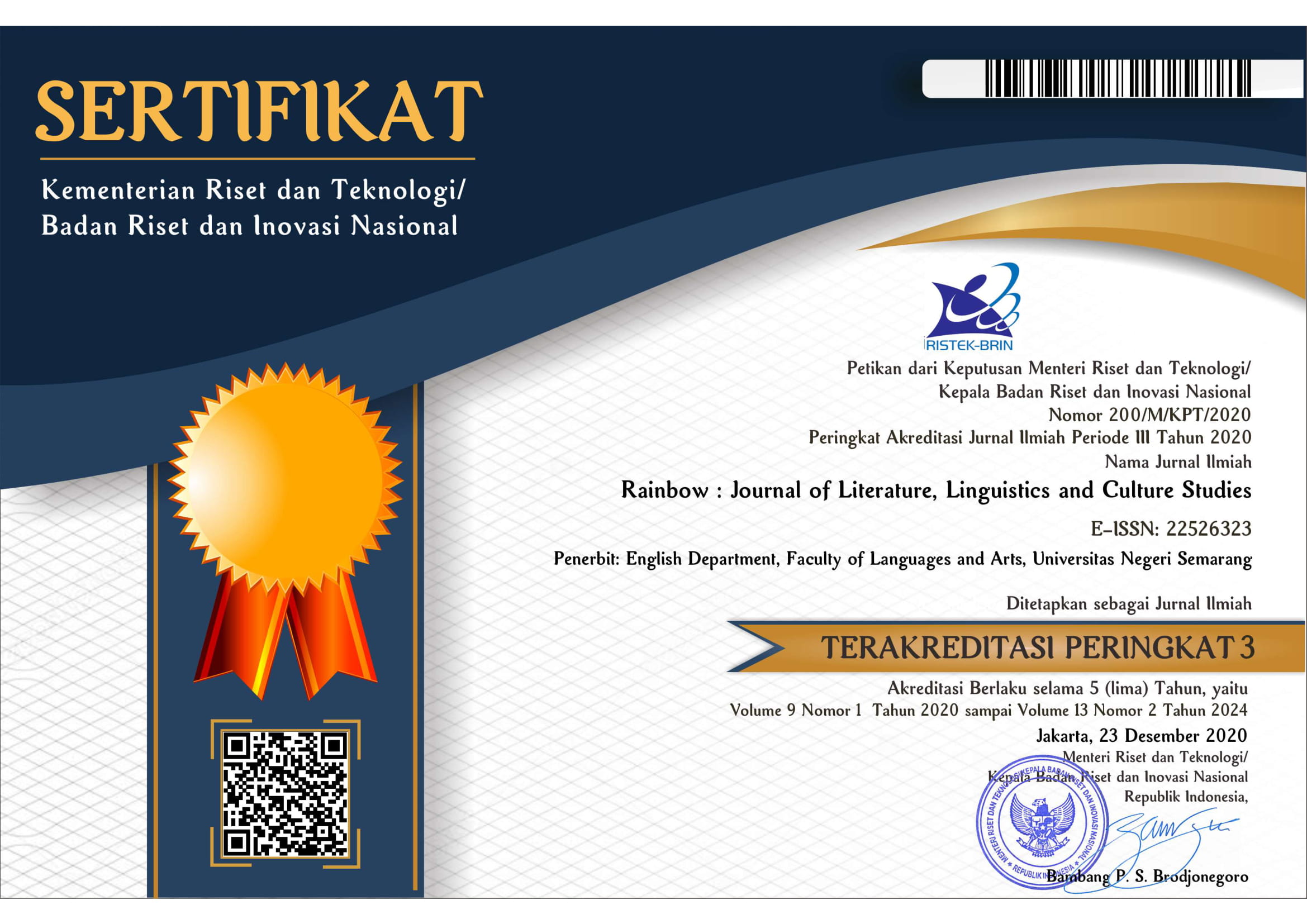Condolence strategy used by Facebook user to respond obituary news
An applied linguistic study
Abstract
Technology has changed the world of human communication today. News, information, and issues are delivered through technological advances with incredible speed. Social media such as Facebook are one of many technology mediators used by the people in the world to share information. This information can be in many forms, such as personal information, selling information, obituary information and etc. Obituary information is shared by the people on Facebook and responded to by other people with various responses. This study is descriptive research to find the strategy used by people in the Indonesian context while responding to the obituary updated on Facebook. The subjects are lecturer’s wife, artist, and an abortion girl. This study has described the responses from Facebook users as the strategy in responding to the obituary. The finding of this study showed that the condolence strategy used always depends on the person who dies itself. The person who is seen as the good person will have a good response, while someone who is seen as a bad person, in this case, the girl who did an abortion, has a positive and negative response.
References
Abdul-Majid. (2019). A Cross-Cultural Study Speech Act of Condolence in English and Arabic. 8118(11), 544–568.
Agustina, A. C. L. (2004). Sosiolinguistik : perkenalan awal / oleh : Abdul Chaer, Leonie Agustina (Cet.2). Jakarta :: Rineka Cipta.
Al-shboul, Y. (2013). Condolences strategies by Jordanians to an obituary status update on facebook. GEMA Online Journal of Language Studies, 13(3), 151–162.
Asur, S., & Huberman, B. A. (2010). Predicting the future with social media. Proceedings - 2010 IEEE/WIC/ACM International Conference on Web Intelligence, WI 2010. https://doi.org/10.1109/WI-IAT.2010.63
Fahey, R. A., Matsubayashi, T., & Ueda, M. (2018). Tracking the Werther Effect on social media: Emotional responses to prominent suicide deaths on twitter and subsequent increases in suicide. Social Science and Medicine. https://doi.org/10.1016/j.socscimed.2018.10.004
Farnia, M. (2008). “May God Forgive His Sinsâ€: Iranian Strategies in Response to an Obituary Note. Komunikacija i Kultura Online, II(2), 315–323.
Gall, M., Borg, D., P, G. J., & R, W. (2014). Applying Educational Research. In Pearson Education Limited.
Han, X. (2019). A comparative study on the realization of the condolence speech act between KCFL learners and CNSs Xinyu Han. International Conference on Literature, Art and Human Development (ICLAHD 2019), 148, 104–116. https://doi.org/10.25236/iclahd.2019.022
Hart, L. (2015). Social media. In Reputation Management: The Key to Successful Public Relations and Corporate Communication. https://doi.org/10.4324/9781315879987-12
Hei, K. C. (2018). Ethnic Variations in Malaysian SMS Condolences. International Journal of Linguistics, Literature and Translation.
Kentish-Barnes, N., Chevret, S., & Azoulay, E. (2016). Impact of the condolence letter on the experience of bereaved families after a death in intensive care: Study protocol for a randomized controlled trial. Trials. https://doi.org/10.1186/s13063-016-1212-9
Kentish-Barnes, N., Cohen-Solal, Z., Souppart, V., Galon, M., Champigneulle, B., Thirion, M., Gilbert, M., Lesieur, O., Renault, A., Garrouste-Orgeas, M., Argaud, L., Venot, M., Demoule, A., Guisset, O., Vinatier, I., Troché, G., Massot, J., Jaber, S., Bornstain, C., … Azoulay, E. (2017). “it was the only thing i could hold onto, butâ€: Receiving a letter of condolence after loss of a loved one in the ICU: A qualitative study of bereaved relatives’ experience. Critical Care Medicine. https://doi.org/10.1097/CCM.0000000000002687
Miles, M. B., Huberman, A. M., & Saldana, J. (2014). Qualitative Data Analysis: A Methods Sourcebook. Third Edition. In The SAGE Handbook of Applied Social Research Methods.
Murad, T. M. (2013). “May allah not let you experience another sorrowâ€: Condolence strategies used by lecturers who are native speakers of Arabic L1 toward their colleague who is native speaker of Hebrew in Hebrew L2. Theory and Practice in Language Studies. https://doi.org/10.4304/tpls.3.1.17-22
Nurlianingsih, D., & Ayu Imperiani, E. D. (2020). An Analysis of Condolences Speech Act by Indonesian Adolescents. Advances in Social Science, Education and Humanities Research, 430(Conaplin 2019), 34–38. https://doi.org/10.2991/assehr.k.200406.008
Pishghadam, R., & Morady Moghaddam, M. (2013). Investigating condolence responses in English and Persian. International Journal of Research Studies in Language Learning, 2(1). https://doi.org/10.5861/ijrsll.2012.102
Pletikosa Cvijikj, I., & Michahelles, F. (2013). Online engagement factors on Facebook brand pages. Social Network Analysis and Mining. https://doi.org/10.1007/s13278-013-0098-8
Singh, A. (2018). Facebook, WhatsApp, and Twitter: Journey towards Education. SOSHUM : Jurnal Sosial Dan Humaniora, 8(2), 139–149. https://doi.org/10.31940/soshum.v8i2.987
Smith, B. G., & Gallicano, T. D. (2015). Terms of engagement: Analyzing public engagement with organizations through social media. Computers in Human Behavior. https://doi.org/10.1016/j.chb.2015.05.060
Watie, E. D. S. (2016). Komunikasi dan Media Sosial (Communications and Social Media). Jurnal The Messenger. https://doi.org/10.26623/themessenger.v3i2.270
Weaver, M. S., Lichtenthal, W. G., Larson, K., & Wiener, L. (2019). How I approach expressing condolences and longitudinal remembering to a family after the death of a child. Pediatric Blood and Cancer. https://doi.org/10.1002/pbc.27489
Wibowo, S. A. C. A., & Rukmini, D. (2019). The Effectiveness of Sympathy Appeal as Strategy in Law Case. KnE Social Sciences, 2019, 438–448. https://doi.org/10.18502/kss.v3i18.4735
Williams, T. R. (2006). Linguistic politeness in expressing condolences: A case study. International Journal of Languages and Linguistics, 23, 45–62.
Zhou, N., & Jurgens, D. (2020). Condolence and Empathy in Online Communities. https://doi.org/10.18653/v1/2020.emnlp-main.45







